- Home
- Tommy Greenwald
Charlie Joe Jackson's Guide to Not Reading Page 8
Charlie Joe Jackson's Guide to Not Reading Read online
Page 8
As in, six days from now.
“I’m looking forward to it, too,” I said.
Ms. Axlerod laughed again, even though this time I wasn’t trying to be funny at all.
Sunday night—two days before I had to present my Position Paper—I suddenly felt kind of guilty.
It wasn’t Jake reading the books for me that made me feel guilty.
And it wasn’t my parents and my sister not knowing that he was reading the books for me that made me feel guilty.
It was that Jake was over for dinner, and my parents were telling him that he was such a good influence on me and how proud they were that I was reading so much and working so hard on my Position Paper. And that Jake had sneaked a glance at me and kind of shrugged as if to say, If they only knew.
It was the combination of all those things that made me feel guilty.
I had told my parents about a week before that I was writing about cliques in middle school, and they had agreed that it was a great topic to explore. I had showed them the books I was using for my research, which they thought looked fascinating.
Then I had promptly given the books to Jake the next day in school.
Now, all of a sudden at dinner, I was having pangs of guilt.
Feelings can be so inconvenient.
To clear my conscience, I decided to clear the dishes.
“Can I get you boys any dessert before you go off to study?” my mom asked.
“No, thanks,” I said, just as Jake said, “Yes, please.” I wanted to get out of there as quickly as possible. Jake wanted ice cream.
He was digging into some mint chocolate chip when the conversation got even more awkward.
“So Charlie Joe tells us you’re dating Hannah Spivero,” my dad said.
“When did I say that?” I complained. I had no idea where he got his information. How is it that parents always seem to know stuff?
Megan tried to help. “Dad,” she said, “middle-school boys don’t like to talk about things like that.”
But Jake was one middle-school boy who was perfectly happy to talk about things like that, particularly when the things in question had to do with his new girlfriend.
“Yeah, it’s going really well. I can’t believe it,” Jake said. “And it’s all thanks to Charlie Joe.”
I froze. Jake immediately looked at me, like, oops.
My parents, thank God, sat there kind of clueless. Megan said to me, “You’re the one who set them up? Why would you do that? I thought you were like totally in love with Hannah Spivero.”
“Not anymore,” I said, and then by way of changing the subject, I said to Jake, “So you like mint chocolate chip, huh? I’m a coffee man myself.”
Upstairs in my room, Jake gave me incredibly helpful, brilliantly written, chapter-by-chapter synopses of each book I was supposed to read.
It probably took him about a half an hour to write them.
“These were actually really cool books,” he said. “You picked a really interesting topic.”
“Thanks,” I said. “Really, thanks for everything, dude. You totally saved my life!”
Jake sat down on my bed.
“Why do you hate reading so much?”
I had guilt on the brain, three synopses to read and no time for chitchat, so I just said, “I don’t know, I just do.”
He just shook his head sadly. “You don’t know what you’re missing.”
Charlie Joe’s Tip #21
THERE ARE THINGS YOU NEED TO MAKE SURE YOU KNOW WHEN TELLING SOMEONE YOU DID READ A BOOK, WHEN YOU ACTUALLY DIDN’T READ THE BOOK:
1) The title
2) The author
3) What’s on the cover
4) How long it is (approximate)
5) The name of the main character
6) The name of anyone who dies
7) The names of any animals
8) How long it took to read
9) What happened in a specific chapter
10) If you liked it or not
Tuesday morning, 11:10 a.m.
You know that drop of sweat that suddenly appears on your forehead when you get nervous?
And then it slowly trickles down your cheek, like a tear your brain sheds because it’s so sad that you got yourself into this situation?
Well, that drop of sweat was about halfway through its journey when I got up in front of the class to deliver my Position Paper.
Ms. Ferrell was there, of course. But since this was the big academic event of the year, so was the rest of the English department: Mr. Simms, Ms. Cohen, and Dr. Jamison, who was obviously the most important person in the school because he was the only doctor (although I personally never saw him heal anyone).
What seemed like the entire free world was also there, even though it was only the twenty-two other kids in my English class.
I cleared my throat. If only I could have cleared the room.
“Hi everyone, my name is Charlie Joe Jackson,” I began in a scholarly fashion. I saw Timmy roll his eyes. “Thank you for coming today.”
What choice did they have?
“My Position Paper is entitled ‘From Friends to Rivals: How the Pressures Facing Kids Today Makes Them Form Cliques, or Teams, to Face Off Against One Another.’”
Hold your applause.
I plowed ahead. “The books I read for this project are as follows: The Clique as Crutch, by Marvin S. Hackett; Too Many Clubs, Too Little Time, by Sheila Warburg; and The Modern Superkid, by Frederick and Catherine Wilson.”
I took a quick glance at the teachers to see if anyone seemed like they’d heard of the books—hoping they hadn’t, of course—but I couldn’t tell, so I continued.
This was my awesome first sentence:
“It is my contention that because kids in today’s society are under so much pressure to excel, and they spend so much time in studies and extracurricular activities, that they don’t develop the necessary social skills to interact with all their peers, and therefore only socialize with those with their immediate interests, leading to cliques, clubs, and other forms of separation that are ultimately detrimental to the developmental and maturation process as kids try to become adults.”
Too run-on?
* * *
I presented my paper with a minimum of slip-ups, making some good points along the way. I mean, if you want to be technical about it, I’m sure I repeated the same points a few times—who doesn’t? But at the same time, I felt fairly confident that I was doing a pretty good job.
In any event, I had some special surprises planned for the end of my presentation. I was saving the best for last.
“Up to this point,” I announced, “I have given a fairly traditional Position Paper. I read the books, did the research, wrote a thesis statement, and backed up my thesis with facts and figures.” I took a deep breath. Here goes. “But now, ladies and gentlemen, I would like to offer you specific evidence of how kids can fight back, and worry less about getting straight A’s and getting into high school honors classes, and concentrate more on getting to know all the cool and different kinds of kids around them. Because it can be done. And the most important thing is the kids themselves want it to happen.”
I nodded to Timmy, and he stood up. “My name is Timmy McGibney. I usually hang around with kids who like to skateboard and snowboard, but yesterday I had a long conversation with Casey who’s in the orchestra, and he was really nice.”
I nodded to Pete Milano, who got up, smirking. “I think about sports like all day every day, but one time my parents took me to see a Broadway musical, and it was pretty good.” He sat down amidst snickering from his fellow jocks.
I nodded to Eliza, and she got up. “A lot of kids consider me the most beautiful girl in the grade, but that doesn’t mean I only want to hang out with other beautiful girls.” Okay, she didn’t totally stick to script, but moving on …
Katie popped up out of her chair. “For a while I was a dork, then I was a goth, then I was a skater, then I
was a loser, then I was a winner, then I finally discovered who I really was: just a girl.” She grinned at me and sat down.
Let’s just say it, Katie Friedman is plain awesome.
I snuck another glance at the teachers, who were clearly enjoying the show-and-tell. It was going well so far.
Time for the big finish.
* * *
I put my paper down on Ms. Ferrell’s desk as if I were done.
“Thank you all for listening,” I said, wrapping up. “I hope we’ve all learned an important lesson here today. Let kids be kids, and guess what? They just might surprise you.”
I headed to my seat to some healthy applause. I was pretty sure it was B+ applause at least. And then, right on cue …
“Wait a second.”
Everyone stopped clapping … stopped talking … stopped everything.
Hannah Spivero had stood up.
Not just on the floor.
Not just on her chair.
Yup, Hannah Spivero—the girl of my dreams—was standing on her desk.
“I have something to say,” she announced grandly. She waited a beat for the suspense to build—she was a natural performer, it turned out—before going on.
“I guess by now everyone knows that Jake and I are going out.”
We did.
“When Jake first asked me out, I thought he was crazy,” Hannah continued. “Why would I ever go out with someone like Jake? All my friends laughed.” She looked at Jake, who looked back, self-consciously. “But I decided, so what? Who was I to judge him just because he wore glasses and played violin and was in the chess club? Maybe I should give him a chance.”
She paused, milking the moment. “It turned out to be the best decision I ever made.”
Oh man, was she good.
Then Hannah got down off her desk. She walked to the front of the room, then slowly, almost ceremoniously, turned around and walked straight up to Jake Katz.
“I really like you,” said my never-to-be girlfriend to her boyfriend, right before leaning over and giving him a kiss on his glowing, blushing, bright red cheek.
* * *
The place erupted. Chaos. Pandemonium. Anarchy. Bedlam. (Thesaurus.com—check it out.)
Jake nearly had a heart attack. (And if he had, he would have died a happy man.)
And right at my moment of triumph, I realized something about myself. When I came up with the plan to set up Jake and Hannah, I told myself they wouldn’t actually fall for each other, yet somehow I knew it would happen. But it didn’t matter.
That’s how desperate I was to avoid reading. I was willing to see the girl of my dreams kiss someone else.
It was both the greatest and worst moment of my life.
Apparently, I wasn’t quite finished.
Ms. Ferrell shushed the crowd, which took some doing.
“A very impressive presentation, Charlie Joe,” she said, stating the obvious. “And extremely theatrical. But as you know, the teachers often like to ask some follow-up questions, just to ensure that you have complete command of the material.”
Are you kidding? Complete command of the material? Did you or did you not just see me rock this room?
“Of course,” I said.
Dr. Jamison went first. “Mr. Jackson, first of all, I want to tell you how much I enjoyed your paper, and I admire the topic you chose. But I am curious, which of the books did you find most helped you in your research?”
Talk about a softball! The good doctor had lobbed one over the plate. I could smack this one out of the park, thanks to Charlie Joe’s Tip #21.
“I’m glad you asked that, Dr. Jamison. I really enjoyed all the books I read, but if I were forced to pick my most valuable resource, it would have to be Modern Superkid, by Frederick and Catherine Wilson. From the image of the four-headed child on the cover, to the fascinating example of the overworked violin prodigy in chapter seven, I found the book to be extremely compelling. I guess the best way to describe how interesting I found this book was that it was 278 pages long, and yet it went by in a flash.”
The teachers all nodded, and I thought I was home free, until Mr. Simms said, “I remember that book.”
Huh.
Just keep nodding, I told myself.
“And I concur,” he continued, “the violin prodigy story is an invaluable cautionary tale for all parents who are thinking of overloading their children with a myriad of activities.”
I kind of knew what concur meant, and I had no idea what myriad meant, but I knew what all the other words meant, and they were put together in an order that made me very happy. So I nodded in agreement, and Mr. Simms smiled.
Ms. Cohen was up next. “Charlie Joe, I’m not completely convinced that all the blame can be placed at the feet of adults. The children are willing participants in this whole vicious cycle. Can you please explain how the various books you’ve read illuminated your theories on adult pressure versus peer pressure? Are they clear in delineating the differences between the two?”
Stay calm, my young friend, stay calm … form a quick mental image of Jake’s synopses in your mind … ah, here they are … and … Go!
“Well, Ms. Cohen, that’s a very good question. All the books did stress how the kids are ultimately responsible for changing their own behavior, but perhaps it is best explained by Sheila Warburg, in her book Too Many Clubs, Too Little Time. She says in Chapter 3, which is entitled ‘Taking Back Your Lives,’ that every kid ultimately has to make their own decisions, that they can’t assume that just because their parents are adults, that ultimately every decision they make is ultimately the correct one.”
I was vaguely aware that I’d used the word ultimately four times in that explanation, but I didn’t care. You do what you have to do.
Ms. Ferrell stood up, which was the equivalent of a Get Out of Jail Free card.
“Well, Charlie Joe, I have to say you handled yourself extremely well. I’m very proud of you. Good job.”
I nodded and sat down. Everyone clapped again. The sweat on my forehead was just starting to dry. I started to get some feeling back in my tongue.
So this is what freedom tasted like.
Show of hands: who wants a short chapter?
It’s unanimous.
Katie cornered me immediately after class.
“You were amazing in there,” she said. For some strange reason, it was right at that moment that I realized she had fewer freckles than she used to.
When did that happen?
“Thanks,” I said.
We looked at each other for a few seconds too long, and suddenly it got a little weird.
Katie and I have always had a mutual understanding that we’re better off as friends. We were better as friends in first grade, and we’ll be better off as friends when we’re eighty years old.
In other words, it would never work between us.
Or would it?
“Come on,” she said. “You can’t be serious.”
Like always, she knew exactly what I was thinking.
I hated and loved that about her.
“What?”
“You know what.” She pulled me away from the kids who were still slapping me on the back after my triumph. “It would never work, you and me. We care about each other way too much.”
That may have been the smartest thing anyone ever said to me.
I hugged her. “You’re the best girlfriend I ever had.”
She hugged me back. “By girlfriend you mean girl-slash-friend, right?”
“Of course,” I said, although I wasn’t entirely sure.
* * *
I found Jake—the man of the hour—all alone in the boys’ room, cleaning his glasses.
“That was so awesome,” I said, clapping him on the back. “Thanks again. You are so the man.”
He didn’t look up.
“Do you think she might actually like me?” he asked worriedly. “I mean, now that it’s over, and you did the paper … do you thi
nk she’ll still want to go out with me?”
He blinked, as if he’d just woken up from a dream—a dream called Hannah Spivero.
“I think so,” I answered, and I realized as I said it that I actually meant it. “Believe it or not, I really think so, dude.”
“I THINK SO, TOO!” Jake yelled, and he let out a loud WHOOP! and started jumping up and down and pounding on the paper towel dispenser.
“She likes me! She likes me! Yo everyone, Hannah Spivero likes ME!” he shouted over and over again to the world, even though we were the only people there.
As I watched him the first thing I thought was, this kid is crazy.
The second thing I thought was, I’d be reacting the same exact way.
Charlie Joe’s Tip #22
ALWAYS BE WARY OF THE PLOT TWIST.
Books with a last-second plot twist are just desperately trying to hold your attention until the last minute.
Which is a shame, since the author could have saved us all a lot of trouble by just ending the book earlier.
I’ve noticed that this book has changed a lot since I started it.
It’s become more like a book book.
Which is not the book I set out to write.
I’m not sure what happened.
No one liked to admit it, but everyone looked forward to the last big social event of the school year.
The name, The Year-End Dance, was boring and nerdy. But the ingredients—pizza, an ice-cream sundae bar, and dancing close to girls—were all right on the money.
It was the last weekend of the year. There were only two days left of school, that last random Monday and Tuesday that never make any sense, because all the tests and homework are done, and nobody does anything but walk around saying good-bye, signing yearbooks, and giving each other hugs. (The whole hugging thing has gotten pretty out of control, by the way. Now kids hug if they haven’t seen each other for three whole minutes. They should drop Sex Education and replace it with Hug Education.)
And people were starting to talk about their summer plans.

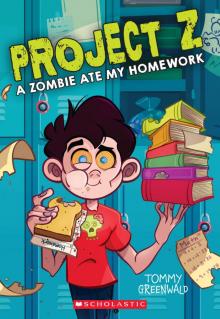 A Zombie Ate My Homework
A Zombie Ate My Homework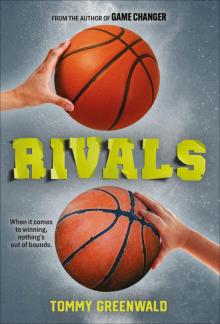 Rivals
Rivals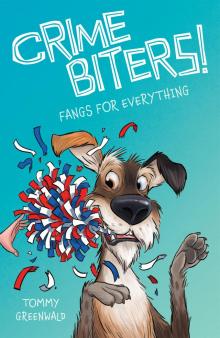 Fangs for Everything
Fangs for Everything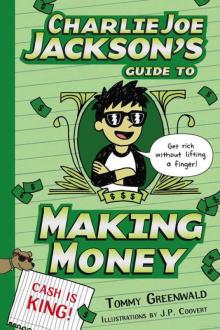 Charlie Joe Jackson's Guide to Making Money
Charlie Joe Jackson's Guide to Making Money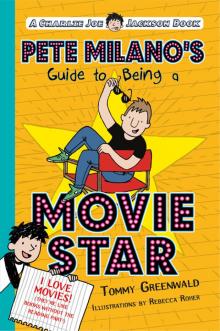 Pete Milano's Guide to Being a Movie Star
Pete Milano's Guide to Being a Movie Star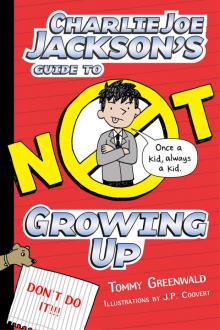 Charlie Joe Jackson's Guide to Not Growing Up
Charlie Joe Jackson's Guide to Not Growing Up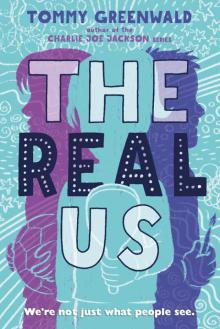 The Real Us
The Real Us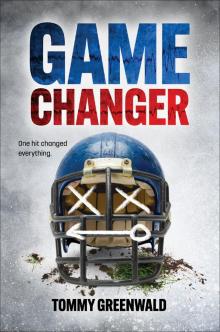 Game Changer
Game Changer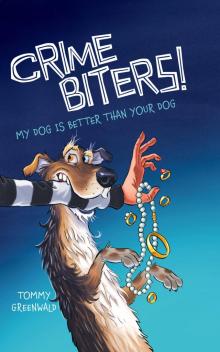 My Dog is Better than Your Dog
My Dog is Better than Your Dog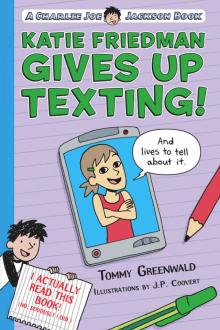 Katie Friedman Gives Up Texting!
Katie Friedman Gives Up Texting!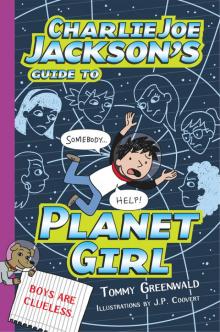 Charlie Joe Jackson's Guide to Planet Girl
Charlie Joe Jackson's Guide to Planet Girl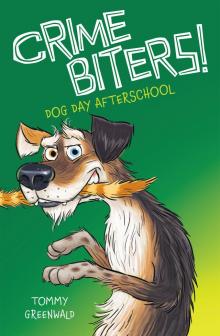 Dog Day Afterschool
Dog Day Afterschool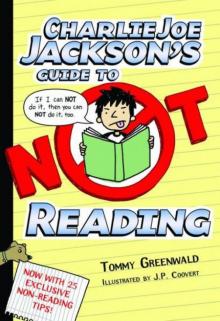 Charlie Joe Jackson's Guide to Not Reading
Charlie Joe Jackson's Guide to Not Reading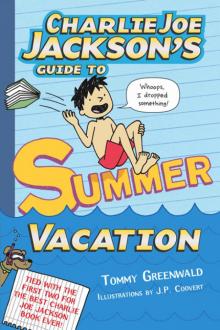 Charlie Joe Jacksons Guide to Summer Vacation
Charlie Joe Jacksons Guide to Summer Vacation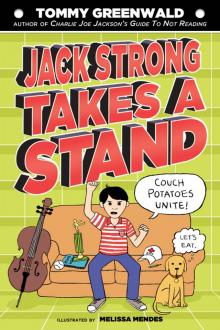 Jack Strong Takes a Stand
Jack Strong Takes a Stand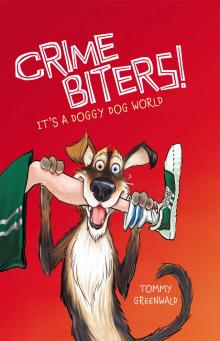 It's a Doggy Dog World
It's a Doggy Dog World